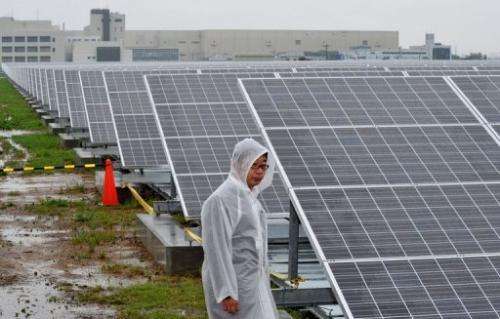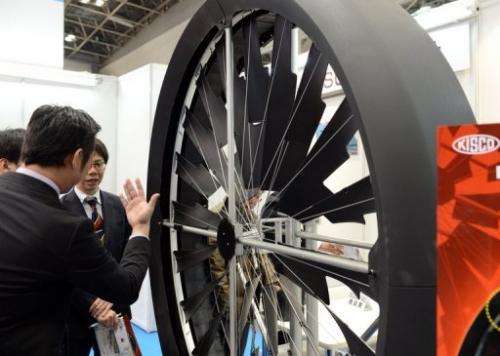File photo shows solar power panels outside a plant in Kyoto, Japan on July 1, 2012. US investment banking giant Goldman Sachs said on Monday it will start investing in Japanese renewable energy projects, with a reported $2.9 billion outlay over the next five years.
US investment banking giant Goldman Sachs said Monday it will start investing in Japanese renewable energy projects, with a reported $2.9 billion outlay over the next five years.
The injection comes after Japan's government stepped into the green power market to set minimum prices in a bid to encourage the sector as the country seeks to rebalance its post-Fukushima energy mix.
A wholly owned unit in Tokyo said it will invest in a solar power generation project in Ibaraki prefecture on the outskirts of Tokyo, which is due to start operation in January 2015.
The firm, Japan Renewable Energy, will put some 13 billion yen into the project, its first, which will have power generation capacity of 40 megawatt, a company spokesman said.
The Ibaraki project is just one of a number of ventures involving wind or solar that Japan Renewable Energy is part of in Japan, it said, with the business daily Nikkei saying it would pour up to 300 billion yen ($2.9 billion) into the sector over coming years.
Electricity generated at the Ibaraki facility will be supplied to major utility Tokyo Electric Power (TEPCO)—the operator of the crippled Fukushima nuclear plant—over an expected span of about 20 years, it said.
Goldman Sachs has already invested in renewable energy firms in the United States and India.
Last year the government introduced a scheme that guaranteed generating companies a premium for the electricity produced from renewable sources and forced the country's power monopolies to buy whatever was on sale over 20 years.
Visitors look at KISCO's Tam Turbine wind power generator at the company's booth during the PV Expo in the World Smart Energy Week, in Tokyo, on February 27, 2013. Last year Japanese government introduced a scheme that guaranteed generating companies a premium for the electricity produced from renewable sources and forced the country's power monopolies to buy whatever was on sale over 20 years.
The move was part of a plan to dramatically increase the amount of electricity from renewables, up from its current less-than 2 percent, and reduce Japan's reliance on expensive imported fossil fuels.
Until the tsunami-sparked disaster at Fukushima, more than 50 atomic reactors produced around a third of Japan's electricity, but public nervousness about nuclear power has left all but two units offline.
The premium for firms producing energy from solar, wind, hydro-electric and bio-gas is part-funded by a 100 yen ($0.98) monthly levy on consumers' bills.
In recent years, Japanese firms from a range of industries—including mobile phone operator Softbank, a joint venture led by Mitsui Chemicals, and ship- and plant-building firm IHI, have entered the renewable energy business.
In the last fiscal year to March, at least 1.39 million kilowatt of renewable energy generation capacity was created in Japan, most of it solar power generation, according to the industry ministry.
© 2013 AFP

























